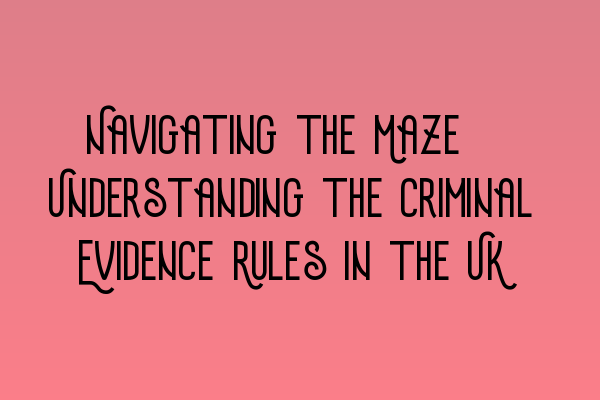Navigating the Maze: Understanding the Criminal Evidence Rules in the UK
Welcome to SQE Criminal Law & Practice Law UK, your trusted source for comprehensive legal information. In this article, we will be discussing the complex topic of criminal evidence rules in the UK. As criminal solicitors, it is crucial to have a deep understanding of these rules to effectively navigate the legal maze and protect the rights of your clients.
The Importance of Criminal Evidence Rules
Criminal evidence rules serve as the foundation of our criminal justice system. They establish the guidelines and standards for the admissibility of evidence in criminal trials. These rules ensure fairness, accuracy, and reliability in the determination of guilt or innocence.
Understanding criminal evidence rules is essential for both the prosecution and the defense. Prosecutors must present admissible evidence that proves the guilt of the accused beyond a reasonable doubt, while defense solicitors must challenge the admissibility and credibility of the evidence to protect their clients’ rights.
Key Components of Criminal Evidence Rules
There are several key components that form the basis of criminal evidence rules in the UK. These include:
- Hearsay: Hearsay evidence, which is an out-of-court statement offered for the truth of the matter, is generally inadmissible unless it falls within one of the exceptions. Familiarizing yourself with the exceptions to the hearsay rule is crucial for effectively presenting or challenging evidence.
- Character Evidence: Evidence related to a defendant’s character is subject to specific rules. It is essential to understand when and how character evidence can be introduced and its potential impact on the case.
- Expert Evidence: Expert witnesses play a vital role in many criminal trials. Understanding the rules regarding the admissibility of expert evidence and the qualifications required for an expert witness is crucial for effectively utilizing expert testimony.
- Privilege: Privileged communications, such as those between solicitor and client or doctor and patient, are protected from disclosure unless certain exceptions apply. Understanding the various privileges and exceptions is crucial for protecting client confidentiality.
Staying Up-to-Date and Preparing for SQE Exams
To excel in your career as a criminal solicitor, it is vital to stay up-to-date with the latest developments in criminal evidence rules. SQE 1 Practice Exam Questions and SQE 1 Practice Mocks FLK1 FLK2 offer valuable resources for testing your knowledge and understanding of the subject matter. Additionally, our SQE 2 Preparation Courses and SQE 1 Preparation Courses can provide the necessary guidance and preparation for your upcoming exams.
For the latest information regarding SRA SQE Exam Dates, make sure to regularly check our website.
At SQE Criminal Law & Practice Law UK, we are dedicated to providing the highest quality legal resources and support. Navigating the complex world of criminal evidence rules is no easy task, but with the right knowledge and preparation, you can confidently represent your clients and achieve success in your legal career.
Thank you for choosing SQE Criminal Law & Practice Law UK as your go-to resource for criminal law information. Together, let’s navigate the maze of criminal evidence rules and make a difference in the pursuit of justice.
